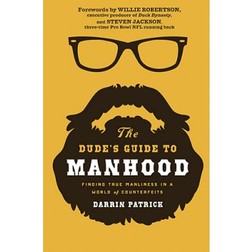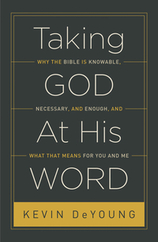|
Here's a sampling of some of the things I've been reading and reviewing this week. The hope is that these bite-sized sections of books, articles, blog posts, etc will stand on their own and be beneficial in-and-of-themselves. But I also hope that some of you will like these excerpts enough that they pull you into the larger work from which they've been taken.
Let's start sampling:
0 Comments
In addition to directing the Brookside Institute, one of the "hats" that I wear is that of men's pastor. This means I help lead and shepherd a network of men's Community Groups, and spearhead an event every now and then. And I spend a lot of time with guys. I sit with a lot of men in my office, hearing their praises and their problems. I get to know guys over lunch or coffee and hear about what "normal life" looks like for them. I've spent time with men at football games (#GBR) and baseball games and shooting ranges and hospital rooms and backyards.
Most of the guys I interact with are legitimately trying really heard. They're trying hard to find fulfillment and do right by their families. They're putting in effort (most of 'em) to make relationships work and keep the utility payment current. In my experience, a lot of men want to do the right thing. The problem is, they don't always know what the right thing is. A lot of men I meet are trying really hard, but many of them are lined up on the wrong trajectory. I know guys who are putting forth the effort, but their aim is off. As I encourage and exhort men, then, my focus isn't as much on trying to draw forth effort as it is to direct the aim of their lives and where they're pointed. It's not necessarily men's trying that needs attention, it's more often their trajectory. As I work to point men in the right direction (and keep my own alignment on track!), Darrin Patrick's Dude's Guide to Manhood will be a helpful tool for this task. Our "sampler platter" has been a weekly series on this blog. (For a brief introduction to this series, click here or here to see previous entries.) In this post I want to continue the same trend this series has begun by pointing you to a few "bite-sized" portions of things I've been reading or reviewing. But this week I'm going to add a twist: Each of the readings this week will be related to teaching and/or learning.
This focus on teaching and learning is important to do. Remember that The Brookside Institute is all about building and reinforcing foundations of the Christian faith - and the primary way we do this is through teaching and equipping. (Click here to read a bit more on the core message of the Brookside Institute.) Since that's the case, we can't focus only on WHAT we teach. We also need to think deeply about HOW we teach and HOW others learn. We need to champion THAT the value of teaching is worth pursuing and upholding. I'm hopeful the readings this week will help keep some of these things in front of us. Let's start sampling: I recently wrote about "Five Tools That Can Help You Understand the Bible." I'm grateful for these tools myself, and I've heard enough positive comments from others about them to know that the benefit of these sites extends beyond my own personal preferences. We have access to tremendous resources (online and print), and great things can result from us using these resources well.
But let's be honest: access to these sites also brings unique dangers. If we don't approach study tools with the right frame of mind, these tools can actually do more harm than good. Here are three dangers that accompany unparalleled access to study tools, and how we can steer clear of them. In a blog post last week, I started a "Sampler Platter" series that I hope to include pretty much every week on this blog. Since we're still new to this series, let me repeat the intro here, and then we'll get into some new "samples" following that: Most of us have eaten out at a restaurant and tried a "sampler platter" - a plate with bite-sized portions of a few items from the menu. I've known people who use this platter as their meal. And I know others who have used this platter as a way to learn what they like, so they can order a full meal of that menu item next time around. Let's start sampling:
Read books that push you into the Bible - books that increase your love for God's Word, your insight into God's Word, and your awareness of what God's Word is.
I've heard this recommendation more than once. I've made this recommendation more than once. I've experienced the benefits of following this advice more than once. And now I'm eager to draw your attention to another book that lines up perfectly with this recommendation to read books that push you into the Bible. One of the questions I'm often asked is this: "What are some good online resources for studying and understanding the Bible?" This is a good question! After all, there are many, many, many (many!) websites devoted to the Bible and Christianity. And we've also heard the axiom that "you can't trust everything you read on the internet." Since we all know there's more information on the internet we can ever fully access, where might we start? Since we all know there's stuff on the internet that's reliable and other stuff that's flat-out wacky, what can we (generally) trust? If you've ever asked these sorts of questions, here are five online tools that can help you dig into and understand the Bible. (They've helped me, anyway!)
Most of us have eaten out at a restaurant and tried a "sampler platter" - a plate with bite-sized portions of a few items from the menu. I've known people who use this platter as their meal. And I know others who have used this platter as a way to learn what they like, so they can order a full meal of that menu item next time around.
This post will launch us into what will be a (most) weekly series where I give you a "sampler platter" of some of the things I've been reading. Even more specifically, I want to introduce you to some of the most worthwhile portions of what I've been reading - usually 3 or 4 excerpts. The hope is that these bite-sized sections of books, articles, blog posts, etc will stand on their own and be beneficial in-and-of-themselves. But I also hope that some of you will like these excerpts enough that they pull you into the larger work from which they've been taken. Let's start sampling: The Brookside Institute is a lot of things. It's a series of classes on the Bible, Christian theology, church history, and more. It includes this blog. Maybe someday it'll add some other things (I've always got ideas!). But what's the unifying idea that I'm committed to threading into whatever we do? What's the filter that helps us discern whether something aligns with what we're about or not? What's the core of the core of the core of the Brookside Institute? I'm glad you asked.
|
Tim WiebeChristian. Husband. Father. Pastor. Learner. Contributor. Reader. Categories
All
Archives
June 2024
|
© 2014-2024 | 11607 M Circle, Omaha NE, 68137 | www.thebrooksideinstitute.net










 RSS Feed
RSS Feed
